Marco Antonio Zamboni Zalamena and his matè bag have arrived but I cannot find either. Three different bus stations in southern Yunnan’s hot capital of Jinghong are empty of him. I’m ripped on far too much tea, slightly manic, but entirely sure somewhere in the heat of the city’s three main bus terminals I will find him. Finally a local calls on my phone me telling me that a “friend” of mine has arrived and I hear Marco’s warm Latin accented English telling me he is indeed “here” though he isn’t sure where that “here” might be. Someone finally tells me in Mandarin where that “here” is. Where he is, is the bus station that I’ve just left. I return via a motorized tuk-tuk driven by an old woman who has fire in her veins and I suspect a mild addiction to speed. Either that, or she has no idea how close to the ‘edge’ she really is. She drives with an aggression that is both thrilling and nerve-shredding.
Marco, his matè, and his fabulous beard have arrived from a long bus ride from Thailand. His love of opium history and slight addiction to mate, South America’s match my own addictive diversions regarding tea. Picked up by tea suppliers of mine in a black sedan, we are soon on our way to my beloved little town of Menghai that is quickly becoming a big-little city fueled entirely by tea and its profits. Our little journey has two fuzzy goals: one, is to introduce another medicinal stimulant to locals – who already in my view have ‘the’ most powerful panacea and stimulant on the planet – and to compare, observe, listen and partake of the inevitable reactions. As always too, there is the vital element of enjoyment of each moment we are granted with the green.
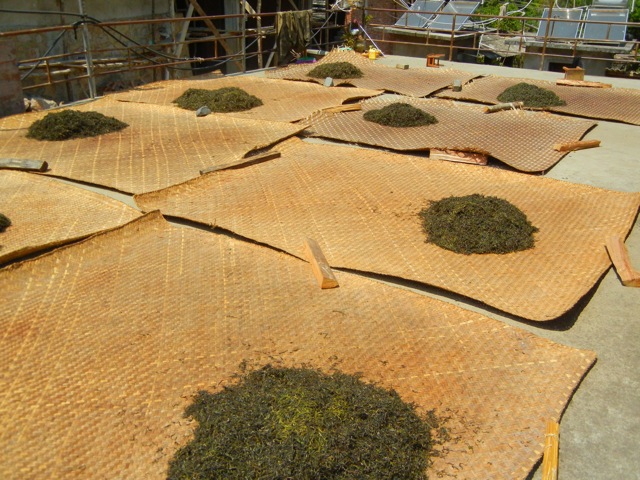
My own long established green obsession; a fresh spring tea harvest awaiting our attentions in southern Yunnan
Marco’s first night is one to remember. Upon arriving Yi Shen, an old friend has shoved two litres of newly picked seismically potent Pulang tea into Marco’s mouth, along with a meal of typcially spectacular abundance. Marco’s smiles belie the fact that he is under siege from the moment he arrives. Menghai’s generosity – and its rampant teas – are upon him and his dark eyes are blazing with hyper heat well past midnight. The heavy stimulants in all of the wondrous teas will keep him up for all but two hours of the night.
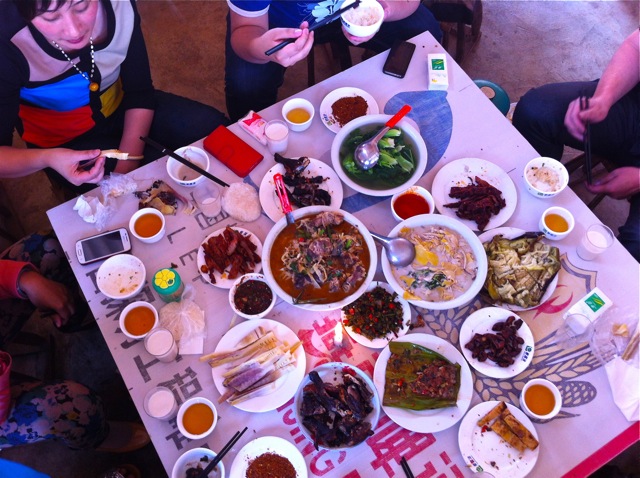
One of the inevitable meals that need our undivided attentions. Eating is one of the only interruptions to tea consumption in the Puerh regions of Xishuangbanna
Marco and I have long spoken of our desire to journey into the oldest of tea lands with the intention of introducing another green stimulant in dried form to locals that know stimulants like few others. He has come armed with matè, a stunning leather matè bag from his father, along with the necessary paraphernalia: a silver ‘straw’, a gourd cup and two kinds of mate. In short, he is armed, but so too I remind him, is Menghai. Whereas matè’s documented history is relatively short, its use probably spans back deep into time.
My task in all of this potent green fun is to translate, explain to local tea friends what this is all about, and of course enjoy the comparisons of tea and matè. Marco’s presence will not deter in any way from my own sourcing and emphatic days spent slurping in tea in the tea mountains of southern Yunnan. This place has in time become a vast green beacon for my thirst and I and welcoming people is both daunting and exciting. It is the notion of introducing someone into a sanctum of sorts, and one of my worshiping places.
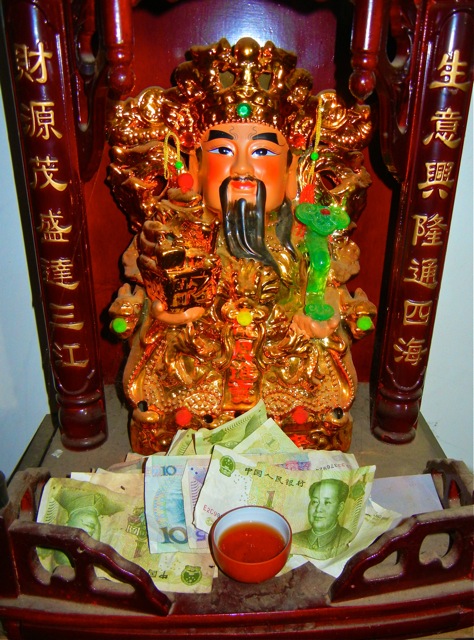
Even the gods require tea. A deity and place of worship with cash and a single cup of tea shows the priorities of worship in southern Yunnan
Our little hotel is a white dorm room with mosquito coils, mosquitoes, blank hard floors and two beds…along with occasional languid bursts of hot water. It is but a resting place for nights and nothing more. Our activities will centre around three tea shops in Menghai and our inevitable outings into the tea mountains.
Menghai serves its first purpose perfectly. In a friend’s tea shop, Marco is introduced to recently harvested teas which make this region one of the world’s iconic tea hubs. The matè that he has brought along, we’ve decided, will only be introduced gradually as there is far less of it and less variations than our dear friend tea.
Food here runs the gamut that Yunnan is famous for: sour, sour-spicy, bitter-spicy, plain old spicy, and then a ‘spicy’ that annihilates any bacteria unfortunate enough to reside anywhere in the body. It is plentiful and comes three or more times a day out of small kitchens that are barely large enough for a sink to sit comfortably.
Our hostess, Yun, an old friend of mine is local Hani and she and her family have long cared for me in between my raging bouts of seeking teas. They ply Marco as I happily knew they would, with food, teas that take the mouth on long journeys, and enough generosity to embarrass. During one afternoon tea session as Marco and I both buzz with the heady narcotic effects of fresh spring teas that are but days old, Marco looks at me with a hopeless expression and asks: “When should I introduce the matè? Everyone is always drinking tea here.” I softly urge that we wait and bide our time, telling him that for now he should simply enjoy the teas on offer…not that he hasn’t been, mind you.
During the sessions I catch up on tea prices – which startle the mind of anyone not familiar with the obsessive neurosis of buyers and sellers and the inevitable swings in prices. Banzhang teas have continued their skyrocketing ascent, reaching the almost silly price of $700.00 US per kilo. While the quality hasn’t improved (though many would ask “how can one improve upon perfection”?) the hype surrounding this Puerh classic is almost a story in itself. I wonder though at the fate that this kiss of fortune might have ultimately upon the tea. Though it is a stunning tea that hits all of the right notes, even locals claim that they are not comfortable with the situation.
My interests inevitably lie in the ‘teas that are coming up’. The yet to be popular ones, and the little teas that grow unheralded or disturbed deeper in the mountains, though we will visit Banzhang and some of the other ‘big hitting’ teas of the Puerh world.
A couple of days in, with Marco still entirely sleepless we formulate our travel plan which might be more accurately described as ‘tea-fueled, tea inspired plans’. It is important to note that the notion of ‘hurry up and wait’ was perhaps perfected in this part of the world of southern Yunnan. Things simply happen when they happen and the body and mind must be conscious, ready, and uncomplaining about when suddenly and entirely without warning people simply get up and announce that “We are going NOW!” In some ways this much-aligned system seems contrary to the spirit of tea and its gentle taking, but on the other hand it is entirely in keeping with the region and its wonderful people.


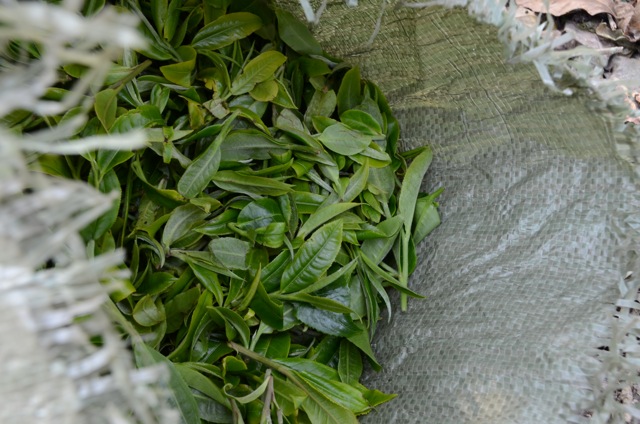
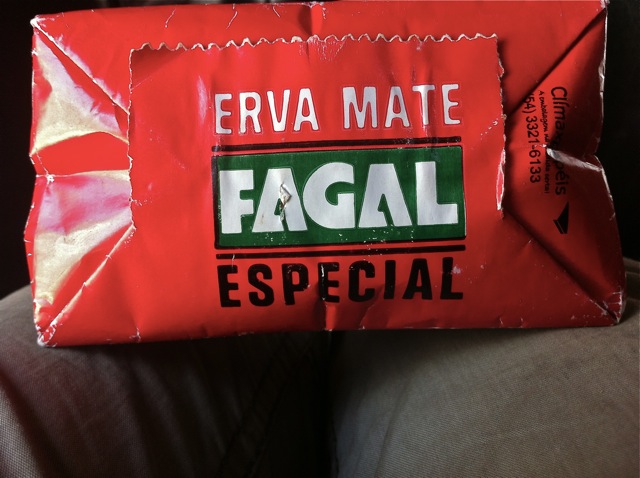
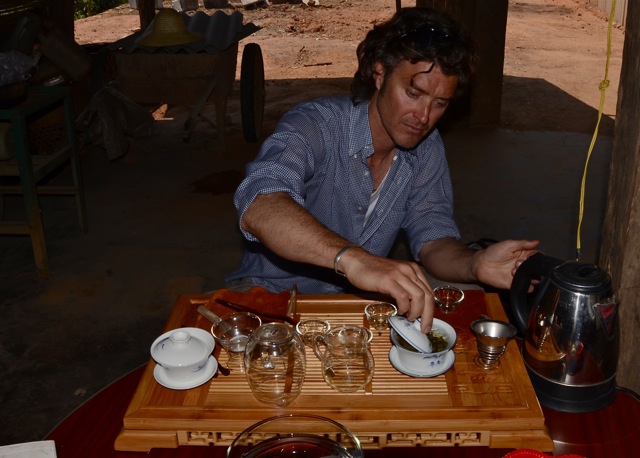
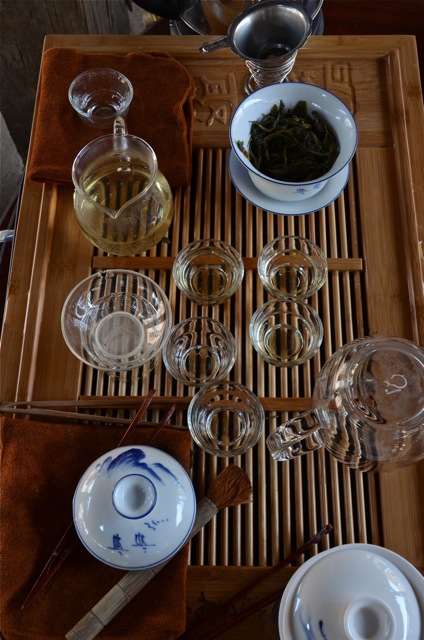
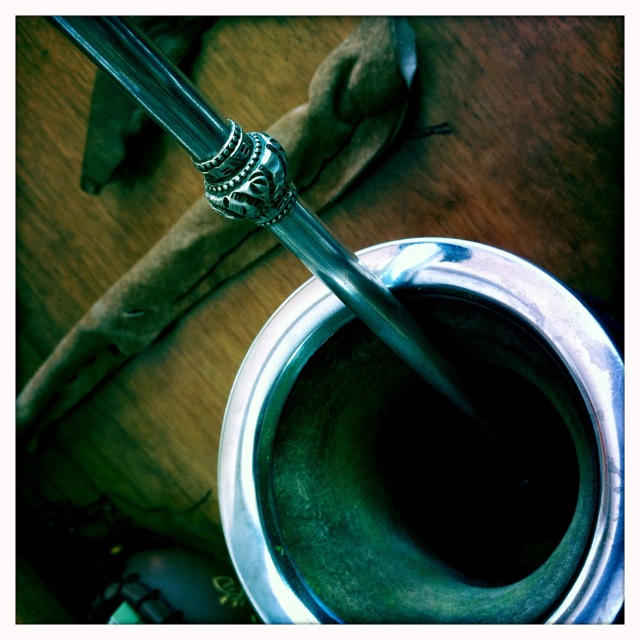
You know the old Daoist folk-tale, surely, about the Old Man whose only horse, he woke to discover one day, had jumped the corral and disappeared. Whose neighbor comes by to commiserate on the Old Man’s “bad luck”, whom the Old Man answers: “Good luck? Bad luck? Who knows?”
Who wakes the next morning to find his horse returned to the corral–with 50 wild horses it had “befriended” alongside it. Who answered his bewildered neighbor’s “Old Man, you were right! Yesterday wasn’t bad luck–it was good!” with the same “Good luck? Bad luck? Who knows?” refrain.
Whose only son, the next day, became permanently lame in a bone-shattering fall from one of the new horses he was trying to break. Who again answered the neighbor’s “You were right! The new horses were bad luck!” with the same skeptical refrain.
Who watched a warlord’s army pass through the village the following day to forcibly conscript every able-bodied man in the village and then lead them into battle against a rival state–which slaughtered every soldier to a man. Except for the old man’s now-lame son.
Whose “Good luck? Bad luck? Who knows?” question is still cycling the yang highs and yin lows to this day, and will never stop, because there’s no such thing as anything stopping.
So yeah, my pre-dawn, tea-soaked thoughts upon reading your line:
The tea regions are certainly benefiting from the prices, which boggle the mind. There are those who already fear the future though, in terms of where the price goes – up? – down? Another aspect which is worrying for locals themselves is whether the quality of the tea will be retained. For now, it goes well for the little tea towns that ten years ago were struggling to make a go of it.
(And I look forward to reading about this mate stimulant. Never heard of it.)